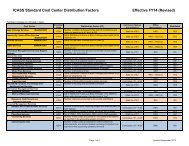Job Discussion Help Sheet (JDHS) - ICASS
Job Discussion Help Sheet (JDHS) - ICASS
Job Discussion Help Sheet (JDHS) - ICASS
You also want an ePaper? Increase the reach of your titles
YUMPU automatically turns print PDFs into web optimized ePapers that Google loves.
MClass <strong>JDHS</strong> for Supervisor Use with Incumbent input<br />
Mission Classification System (MCLASS)<br />
<strong>Job</strong> <strong>Discussion</strong> <strong>Help</strong> <strong>Sheet</strong> (<strong>JDHS</strong>)<br />
Current Post Position Title<br />
Current series and grade<br />
Mission/Agency/Office<br />
<strong>Help</strong> sheet drawn up by:<br />
Manager/supervisor<br />
Incumbent<br />
Interview date/time/place<br />
Return form to HR Classifier<br />
NLT:<br />
Completing this document<br />
<strong>Help</strong>s you prepare for the job discussion with the HR Classifier conducting the job evaluation. Complete, accurate and<br />
objective data is critical to a valid job classification. As the current supervisor (along with input from the incumbent),<br />
you provide valuable information on the types of responsibilities and demands that the job faces. Remember – the job<br />
is being evaluated, NOT personal performance of the employee/job holder. When thinking about the job, presume<br />
that the job duties are being performed at the fully successful level. Consider ONLY the REGULAR and<br />
RECURRING job duties and responsibilities, NOT necessarily events or achievements that are accomplished on an<br />
infrequent-only basis (10%), unless CRITICAL to safety or security needs.<br />
The <strong>JDHS</strong> is divided into several sections: 1. Position‟s place in the organization; 2. Main purpose and duties; and 3. Questions<br />
corresponding to each of the five MCLASS evaluation factors. The five MCLASS factors are:<br />
1. Responsibility. Considers the extent to which the job controls resources, the amount of discretion the position possesses<br />
and the level of advice provided to others.<br />
2. Knowledge. Considers the type of knowledge, education, training, experience and skills that is essential to be considered<br />
for the job.<br />
3. Intellectual skills. Concentrates on the types of intellectually demanding tasks and situations that anyone doing the job<br />
must tackle.<br />
4. Communication. Records the type and nature of contacts with which the position must communicate in order to do the<br />
job effectively.<br />
5. Environment. Considers where the job is carried out, the types of potential hazards and physical demands, as well as any<br />
unusual work pattern demands.<br />
Please refer to the Position Description (DS298), where appropriate; the PD and <strong>JDHS</strong> MUST agree.<br />
MClass <strong>JDHS</strong>, modified Sept., 2011<br />
Page 1
MClass <strong>JDHS</strong> for Supervisor Use with Incumbent input<br />
1 Position in the organization<br />
Please draw or attach a simple organization chart. Please include at least two levels above and below the<br />
job. Identify the position being discussed with an asterisk (*).<br />
Interviewer’s notes<br />
2 Main purpose and duties<br />
Please describe, in a sentence or two, the essence of the position. See DS298 “Basic Function.”<br />
Please describe 4 or 5 key aspects of the job. For example, describe the 4 or 5 major “roles” this job has<br />
& % of time spent performing the key duty. Exclude duties performed less than 10% of the job holder‟s<br />
time.<br />
MClass <strong>JDHS</strong>, modified Sept., 2011<br />
Page 2
MClass <strong>JDHS</strong> for Supervisor Use with Incumbent input<br />
Interviewer’s notes<br />
3 Responsibility<br />
Consider the extent to which the position requires the planning, organization, direction and control of<br />
resources (money, people, equipment, supplies, land, buildings, and information). Consider the scale of<br />
the resources and the authority of the job holder to manage those resources. Also consider the „freedom<br />
with which the job holder is expected act, the advice given and the resulting impact the position has<br />
internally and externally.<br />
3.1 Staff/contractors<br />
This question involves information about the “people” resources managed by the job holder. Please<br />
indicate the jobs of any staff/contractors controlled, specifying the number of people in each job. Please<br />
complete each sub-section where applicable, but avoid double counting. Example: Line Management for<br />
4 employees would not be listed in Daily Work Guidance for the same group of people.<br />
Long term strategic planning of staff. This means<br />
planning for an entire workforce in a large<br />
organization. This is not actual supervision or<br />
traditional line management of staff.<br />
Line management of staff. This means full<br />
administrative and technical supervision of staff.<br />
Full supervision implies approval of leave,<br />
MClass <strong>JDHS</strong>, modified Sept., 2011<br />
Page 3
MClass <strong>JDHS</strong> for Supervisor Use with Incumbent input<br />
selection of new employees, applying discipline,<br />
and monitoring employee performance. Include<br />
the total number in the job holder‟s own “chain of<br />
command”.<br />
Project management. This implies management of<br />
people in a project setting, where the project has a<br />
defined duration. Exclude persons counted in “line<br />
management” above.<br />
Contractors. This means persons outside the job<br />
holder’s normal chain of command who may be<br />
outside or third-party contractors.<br />
Training – delivery of training courses in a<br />
formalised learning environment. This means<br />
people managed by the job holder in relation to the<br />
job holder’s role as a formal Teacher or Instructor.<br />
Work allocation – e.g., daily work<br />
guidance/supervision. Consider the job holder’s role<br />
in giving out work assignments, or giving daily<br />
instructions to others, but for whom the job holder does<br />
NOT have full supervisory responsibility. Example:<br />
Team Leader or Work Leader role<br />
Interviewer’s notes<br />
3.2 Other resources<br />
For each of the following headings, indicate the type of resources controlled by the position and the<br />
nature of that control. Give some indication of overall value for each basic category (or scale of the<br />
resource in the case of information).<br />
Equipment – personal use, repair and<br />
maintenance, security, safety, purchase<br />
decision, etc. Consider tools and equipment,<br />
including PCs. Define what the job holder<br />
MClass <strong>JDHS</strong>, modified Sept., 2011<br />
Page 4
MClass <strong>JDHS</strong> for Supervisor Use with Incumbent input<br />
does with the equipment (i.e. user, repairer,<br />
purchaser, etc.)<br />
Expendable supplies – issue/receive, determine<br />
supplies levels, purchase supplies, etc<br />
Consider office supplies or other work<br />
supplies, the way in which the job holder deals<br />
with them. Estimate the value of goods held at<br />
any one time. Example:” orders monthly office<br />
supplies of $250 per month”<br />
Buildings/land – security,<br />
maintenance/refurbishment, sell/purchase<br />
decision, etc<br />
Financial matters – handling cash, formulating,<br />
monitoring or managing budgets, etc.<br />
Consider the role of the job holder with respect<br />
to cash, funds, budgets or accounts. Define the<br />
role and the amounts involved.<br />
Information – upkeep, access/security,<br />
management of information resource, etc.<br />
Consider the job holder’s responsibility for<br />
files, databases, records or controllable<br />
information items. Provide examples of the<br />
type and volume of information resources used,<br />
maintained or managed.<br />
Contracted out goods and services – contract<br />
support, management, negotiation, etc. Is the<br />
job holder responsible for contracted out<br />
(outsourced) goods and services? Define the<br />
role responsibility and the amount involved.<br />
Example: Serves as COTR for window cleaning<br />
service contract.<br />
Interviewer’s notes<br />
3.3 Advice / recommendations<br />
If the position is required to provide advice to others inside or outside of the organization, please indicate<br />
the type of advice given and the recipients. Consider advice and recommendation that the job holder is<br />
responsible for providing to subordinates, colleagues, clients or management. Provide good examples of<br />
MClass <strong>JDHS</strong>, modified Sept., 2011<br />
Page 5
MClass <strong>JDHS</strong> for Supervisor Use with Incumbent input<br />
the kind of advice and recommendations that are required of the job holder on a regular basis. See PD #<br />
16.<br />
Post – who and what?<br />
Visitors/Guests- who and what?<br />
External contacts – who and what?<br />
Interviewer’s notes<br />
4 Knowledge<br />
Consider the essential education, training, experience and skills that a person must possess in order to do<br />
the job successfully. This may be different from those that the incumbent actually possesses. Think<br />
about the “know-how” requirements as if the position were undergoing recruitment. Consider the<br />
minimum requirements to perform job duties at a fully successful level. See PD #15.<br />
Knowledge of the organization, external<br />
environment and/or specialist field - 1. What does<br />
the job holder have to know about the<br />
agency/Mission/Section? 2. What does the job<br />
holder have to know about the host<br />
country/region? 3. What kind of subject matter<br />
knowledge is required, independent of internal<br />
procedures or USG policies?<br />
PD -<br />
MClass <strong>JDHS</strong>, modified Sept., 2011<br />
Page 6
MClass <strong>JDHS</strong> for Supervisor Use with Incumbent input<br />
Education The minimum academic<br />
PD -<br />
requirement, include the specific level and the<br />
type. Examples: Completion of secondary<br />
schooling in general studies; Bachelors Degree<br />
in Nursing.<br />
Training / membership of professional body-<br />
What kind of occupational training is required?<br />
Include specialized job training. Examples: safe<br />
driver training, word processing training,<br />
software applications training, procedural<br />
training (Consular or Admin training), cashier<br />
training, etc.<br />
Previous experience Specify the minimum<br />
months or years of prior job-related experience,<br />
and the type of experience. Examples: 3 years<br />
trades and crafts; 5 years accounting; 1 year<br />
general clerical, etc. If prior supervisory<br />
experience is required, specify the minimum<br />
number of months/years required that is beyond<br />
job related experience: Example: 1 year previous<br />
supervisory experience in addition to 3 years<br />
journeyman level experience.<br />
Language and other essential skills. Specify the<br />
minimum host country language and English<br />
language requirements in order to perform job<br />
tasks at fully successful level.<br />
PD -<br />
PD -<br />
PD -<br />
MClass - Level 1: Rudimentary; Level 2: Limited<br />
Knowledge; Level 3: Good working knowledge;<br />
Level 4: Fluent; Level 5: Credentialed Professional<br />
Translator/Interpreter<br />
Interviewer’s notes<br />
5 Intellectual skills<br />
Considers the extent to which the position demands the analysis and evaluation of information in order to<br />
formulate conclusions, ideas or judgements. Please indicate the types of problems the position has to<br />
solve, the degree of future planning required and the need for innovation. Please provide examples.<br />
Problem solving - Identify the typical<br />
problems that the job holder is expected<br />
Most common problems:<br />
MClass <strong>JDHS</strong>, modified Sept., 2011<br />
Page 7
MClass <strong>JDHS</strong> for Supervisor Use with Incumbent input<br />
to resolve independently. Provide<br />
examples of most common problems<br />
solved by job holder regularly, and an<br />
example of most difficult problem<br />
solved.<br />
Most difficult problem:<br />
Planning ahead Think about the job<br />
holder’s work horizon, i.e. how far in<br />
advance the job holder must plan his/her<br />
own activities?. Example:”The<br />
technician plans own work at least 3<br />
days in advance;<br />
Innovation. Think about the opportunity<br />
and/or need to develop new approaches,<br />
procedures, designs, plans, guidelines.<br />
Examples: “must design new<br />
configurations for LAN”; “must adapt<br />
agency reg. into internal SOPs”<br />
Options: None; Daily; Weekly; Monthly; Quarterly; 6 Months, Year, 3<br />
Years out.<br />
Options: None, Limited, Adaptive, Ongoing, High.<br />
Interviewer’s notes<br />
6 Communications<br />
With whom the position communicates, both within and outside the organization, and the nature of the<br />
communication. For each key contact, please indicate the purpose of the contact and the type of<br />
information communicated. Identify if any specialized communication skills are required. (Examples:<br />
Counsels victims of assault; Refers callers to offices; Delivers speeches to conferences; Explains<br />
scientific data to non-experts; Interviews claimants for benefits; Calms down agitated customers)<br />
Who – Why? - What type? Options: Basic, Standard, Complex; Oral; Written<br />
MClass <strong>JDHS</strong>, modified Sept., 2011<br />
Page 8
MClass <strong>JDHS</strong> for Supervisor Use with Incumbent input<br />
Interviewer’s notes<br />
7 Environment<br />
The physical environment in which the job holder operates. It also considers any job related physical or<br />
psychological demands. Identify any job-related particular hazards that exist. Please be specific,<br />
including frequency and/or duration where appropriate.<br />
<strong>Job</strong> location. Identify the primary<br />
location of the work, and any<br />
secondary locations.<br />
Potential job related hazards.<br />
Exclude hazards that may apply to<br />
all staff in the country/city.<br />
Physical demands or Psychological<br />
demands. Examples: heavy lifting;<br />
repetitive work; job related mental<br />
stress.<br />
Unusual work pattern demands –<br />
frequent travel, working away<br />
from duty station, rotating shift<br />
work, etc<br />
Interviewer’s notes<br />
8 Other<br />
Are there any other features of the position not covered above or in the PD which should be noted?<br />
MClass <strong>JDHS</strong>, modified Sept., 2011<br />
Page 9
MClass <strong>JDHS</strong> for Supervisor Use with Incumbent input<br />
Interviewer’s notes<br />
Thank you! HR will contact you with any further clarifying questions before completing the<br />
position classification.<br />
MClass <strong>JDHS</strong>, modified Sept., 2011<br />
Page 10


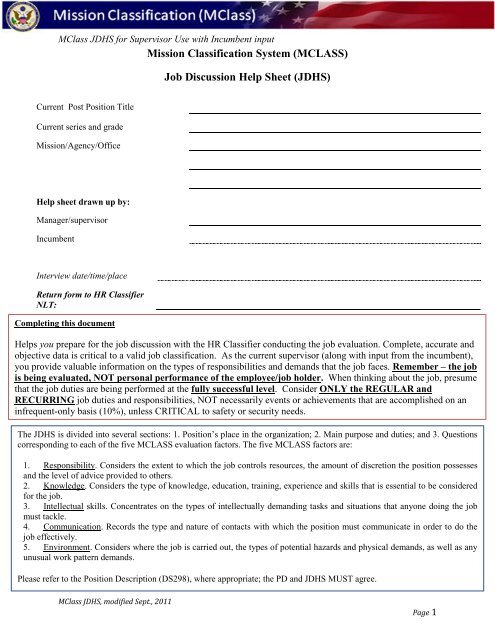
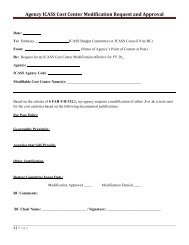
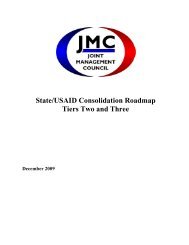
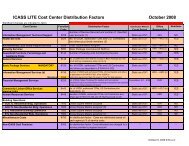
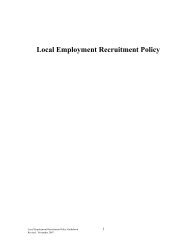
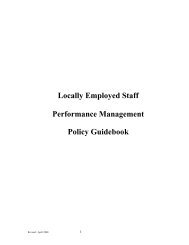
![Appendix D Reviewer Requirements Checklist GDB 2[1]. - ICASS](https://img.yumpu.com/37563692/1/190x245/appendix-d-reviewer-requirements-checklist-gdb-21-icass.jpg?quality=85)
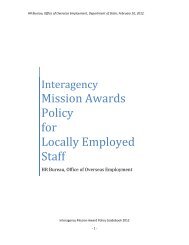
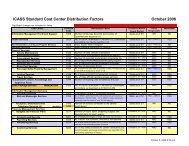
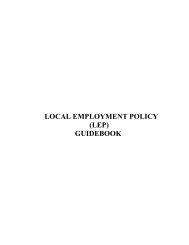
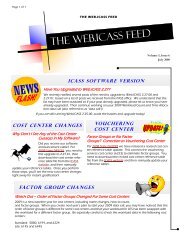
![GPAT for Web[1].ICASS GDB r2.31.00](https://img.yumpu.com/37563643/1/190x245/gpat-for-web1icass-gdb-r23100.jpg?quality=85)
